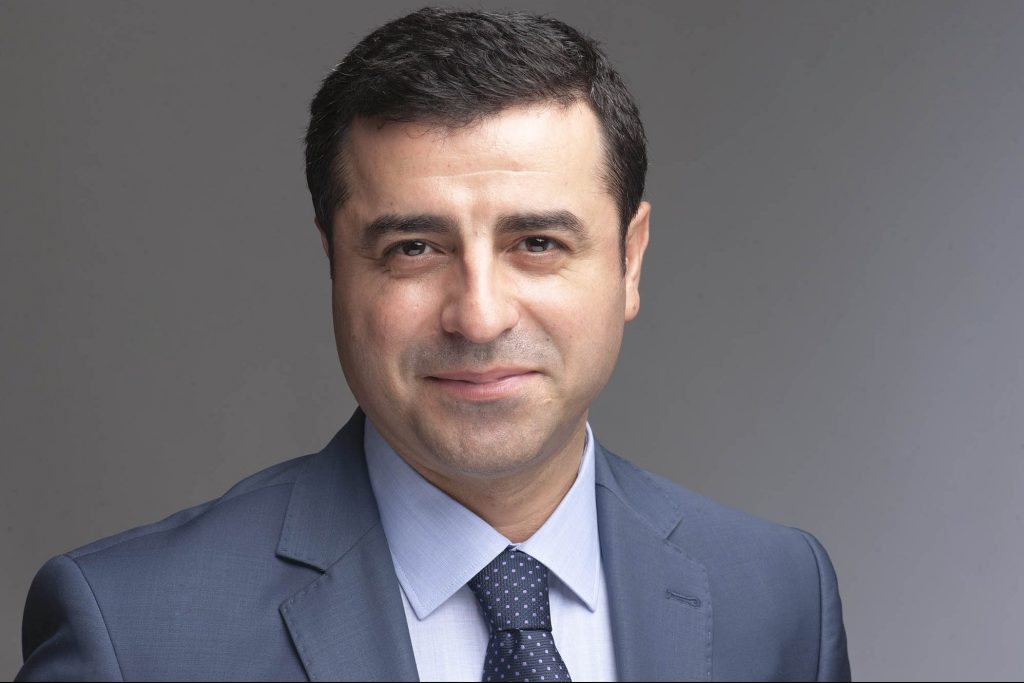Two British Members of Parliament have quizzed the Foreign Secretary Dominic Raab over what action he is taking to help free Selahattin Demirtaş, the jailed former co-leader of the Peoples’ Democratic Party (HDP, Halkların Demokratik Partisi).
Patrick Grady, the Scottish National Party (SNP) MP for Glasgow North, and Labour’s Dr Rupa Huq, the MP for Ealing Central and Acton, tabled separate questions to the Foreign Secretary Dominic Raab on whether he had raised the imprisonment of Demirtaş with his Turkish counterpart Mevlüt Çavuşoğlu.
Demirtaş (pictured above), who is of Kurdish descent, was arrested and detained in November 2016 on charges of promoting terrorism, which the politician vehemently denies.
He was convicted on one of the charges two years later and sentenced to 4 years and 8 months for a speech he made at a Nevruz celebration in Istanbul on 17 March 2013. The speech had references to the PKK and its founder Abdullah Öcalan.
Further charges have been brought against Demirtaş for allegedly inciting violence and large-scale protests across Turkey in October 2014 in response to events in Kobane, in neighbouring Syria, which had come under attack from Daesh.
Demirtaş had called for people to go on to the streets to protest after Turkey had blocked Turkish Kurds from joining the fight against Daesh. Thirty-seven people were killed in the nationwide protests that ensued.
The European Court of Human Rights (ECHR) has twice ruled against the detention of Demirtaş, calling for his immediate release, most recently in December 2020.

The ECHR’s damning judgment said Demirtaş’s detention had the “ulterior purpose of stifling pluralism and limiting freedom of political debate: the very core of the concept of a democratic society.”
Grady, who is also the SNP’s Chief Whip, asked the Foreign Secretary Dominic Raab “what discussions he has had with his Turkish counterpart regarding the European Court of Human Rights judgment ordering the release of Selahattin Demirtaş.”
West London MP Huq also asked the Foreign Secretary “what recent discussions he has had with his Turkish counterpart regarding the imprisonment of Selahattin Demirtaş.”
UK government response to MP questions on Selahattin Demirtaş
Both MPs received the same response from Wendy Morton, the Parliamentary Under-Secretary at the Foreign, Commonwealth and Development Office:
“We regularly raise human rights issues with the Turkish authorities. I did so in December 2020 with my Turkish counterpart. We remain concerned about the four-year imprisonment of Selahattin Demirtaş, former co-chair of the People’s Democratic Party (HDP), in Turkey.
“With our international partners, we call on Turkey to meet its obligations as a founding member of the Council of Europe and release Demirtaş from his extended pre-trial detention.
“The Committee of Ministers of the Council of Europe will supervise the implementation of the judgment in Demirtaş (No.2) v Turkey, a process in which the United Kingdom actively participates.
“Working with our international partners, we will continue to encourage Turkey, including at Ministerial level, to act in line with the conventions of the Council of Europe and to make greater progress on wider human rights reforms.”
What did the ECHR rulings say?
Selahattin Demirtaş, his HDP co-chair Figen Yüksekdağ and other HDP politicians were arrested on 4 November 2016 on the grounds that they were spreading the propaganda of the PKK (Kurdish Workers Party) terror group or inciting violence against the state.
They were all remanded in custody until their trials several years later.
Demirtaş, like the other detainees, vehemently refutes all the charges against him. In one court hearing in January 2017, the lawyer-turned-politician stated that he is not “a manager, member, spokesperson, or sympathizer” of the PKK.
No evidence of Demirtaş’s alleged involvement in the violence at the Kobane protests have been presented by prosecutors, and his Nevruz speech, while containing references to the PKK, did not endorse the terror group or its actions.

In November 2018, the European Court of Human Rights (ECHR) reviewed the case and ordered Demirtaş’s immediate release and that Turkey also pay him €25,000 for violating his freedom of expression, liberty and other rights.
However, Turkey refused to comply with the ruling. Both a lower Turkish court and its Court of Appeal rejected the European court’s decision, claiming it was ‘non-binding’.
Lawyers for Demirtaş have since appealed against his sentence at Turkey’s Constitutional Court.
Demirtaş’s case was then considered by the ECHR’s Grand Chamber, which in December 2020 upheld the earlier 2018 ECHR decision and went further, condemning Turkey for what the court deems to be an unlawful detention.
In examining the facts, the Grand Chamber not only found a lack of reasonable suspicion to justify Demirtaş’ initial detention (violating Article 5.1), but also asserted that Demirtaş’s detention had been pursued for political ends (Article 18 in conjunction with Article 5), and found that his right to freedom of expression had been violated (Article 10).




